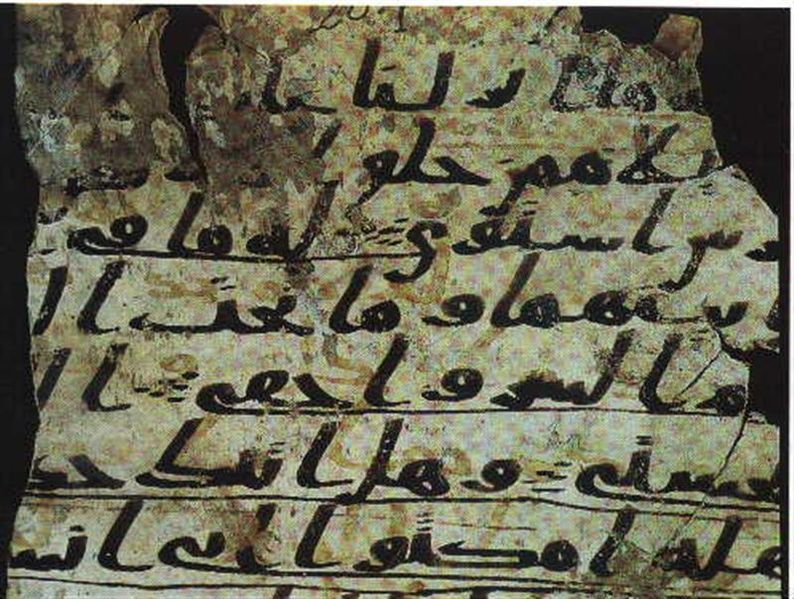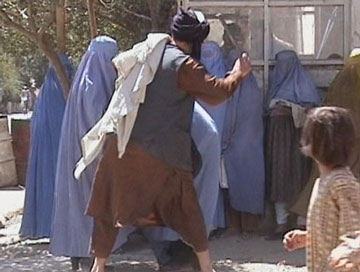
In its beginnings Islam represented a revolution against injustice and corruption, and a corrective movement against many practices of Arab society. But what this revolution started with at the outset was not what it became at the end. For just as soon as things were established among the Muslims, when lands were conquered and metropolises occupied, their funds were exhausted and they were left in dire need of those whom they had revolted against and reformed.
THIS DISINTEGRATION occurred in the Islamic community a short time after the death of the Messenger, so that “one form of Caesarism was replaced with another and one form of Chosroism with another. After Muhammad bequeathed his followers his words along with a state, one class began to propagate his words while another class occupied itself with extending the state. Over time, matters of the state pre-occupied them to the detriment of his words.”
The contradictory relationship that marks the two sources of legislation cast a shadow over morals; ethical considerations became entangled, with one caught up with aspects of the other. All of this had an impact upon how these ethics were adopted by the Muslims and upon how contradictions became generated at the behavioural level. All of this was in addition to the laudable ethical standards which the two sources – the Qur’ān and the Sunna – promoted but which the majority of believers have nevertheless proved unable to apply over the course of Islamic history. Several factors combined to prevent these ethics being applied, the most important perhaps being the rise of wealth and mundane pleasures, the concentration on private, as opposed to public, interests, and the absence of political role models. The initial role models that appeared only served to promote moral derailment and deviancy, and began with a series of conflicts over political and religious authority, conflicts which since the death of the Messenger have persisted to this day.
Muhammad the Messenger did not aspire to idealism or perfection in his moral task, yet we find precisely this objective present and promoted in his monotheistic cause. This point is strengthened by a verse that is cited twice in the context of a single sūra, the sūrat al-Nisā’:
Lo! Allah forgiveth not that a partner should be ascribed unto Him. He forgiveth (all) save that to whom He will. Whoso ascribeth partners to Allah, he hath indeed invented a tremendous sin. [Qur’ān IV,48]
Lo! Allah pardoneth not that partners should be ascribed unto Him. He pardoneth all save that to whom He will. Whoso ascribeth partners unto Allah hath wandered far astray. [Qur’ān IV,116]
This is in addition to vehement descriptions deploring polytheism, and which are found in many verses such as:
Whoso ascribeth partners unto Allah, it is as if he had fallen from the sky and the birds had snatched him or the wind had blown him to a far-off place. [Qur’ān XXII,31]
Lo! whoso ascribeth partners unto Allah, for him Allah hath forbidden paradise. His abode is the Fire. For evil-doers there will be no helpers. [Qur’ān V,72].
The reason, or reasons, for the Messenger not insisting upon idealism or perfection in his moral task was his understanding of sinful human nature: “Ye are all sinners, and the best of sinners are those that repent.” That and his greater understanding of the nature of Meccan and Madinan society and the Arab tribes of the region. Despite the Messenger’s insistence upon idealism and perfection in preaching the doctrine of monotheism, this task was itself not fully successful:
The wandering Arabs are more hard in unbelief and hypocrisy, and more likely to be ignorant of the limits which Allah hath revealed unto His messenger. And Allah is Knower, Wise. [Qur’ān IX,97]
The wandering Arabs say: We believe. Say (unto them, O Muhammad): Ye believe not, but rather say “We submit,” for the faith hath not yet entered into your hearts. [Qur’ān XLIX,14]
And among those around you of the wandering Arabs there are hypocrites, and among the townspeople of Al-Madinah (there are some who) persist in hypocrisy whom thou (O Muhammad) knowest not. We, We know them, and We shall chastise them twice; then they will be relegated to a painful doom. [Qur’ān IX,101]
One might add to what has gone before the Messenger’s understanding of the nature of the contradictions that go along with heaven-sent messages as they interact with a changing, complex reality. The Text succeeds in overcoming these contradictions, at times by resolving them and at other times by yielding to the intractable complexities that surround problems emerging in specific situations in history and society.
The decline is made patent by the absence of philosophy and rationality
So when one of the women of the Ansār, Habība bint Zayd ibn Abī Hurayra, approached the Messenger with her father to complain about her husband Sa’d ibn al-Rabīʽ who had struck her, the Messenger exclaimed: “Vengeance, vengeance; take ye revenge on her husband!” However, shortly after this incident the following Qur’ānic verse was revealed: “Men are in charge of women” [Qur’ān IV,34] after which the messenger declared: “We wanted one thing, but God wanted another.” It is clear that the Messenger wanted affairs to be open just and equal between men and women but that the complex reality of the time and its oppressive patriarchal culture was something that stood in opposition to his values.
One cannot criticize the Text here – whether of the Qur’ān or of the Sunna – nor the reality lived at a time, since actual life had the power to impose what it wanted irrespective of any wish or desire on the part of the Messenger. Rather, criticism should be levelled at those who live in our own age and who wish to establish the circumstances of those ancient times that were conditioned by a complex historical context and a closed-in culture. Such people intend that these historical circumstances are to constitute the constant rule for all times and places.
Even so, one cannot depend on these reasons as pretexts for the moral decline that the Islamic world has witnessed, and witnesses still, ever since the death of the Prophet. At times this decline takes on the stamp of moral and behavioural deterioration, and at other times a preoccupation with form at the expense of content, with appearance over against essence, with ritual and acts of worship at the expense of the content and essential purpose that lies behind these things. Such a decline is made patent by the absence of philosophy and rationality, by the rise in extremism and fundamentalism and the lack of acceptance of the other, in addition to other aspects of obscurantism which, like some hard and fast rule with few enlightening exceptions, have characterised the Islamic scene for centuries.
The path of distortion
Muslims pride themselves that their sacred book – the Qur’ān – has not been subject to any distortion, a fact which they ascribe to its early compilation, in contradistinction to the heaven-sent celestial scriptures. By distortion they mean here the subjecting of the holy text to alterations, replacements, erasures and insertions. But in addition to the reports given by some of the books on hadith detailing the absence of verses or entire sūras from the text which Muslims use today (something which implies direct distortion of the Qur’anic text), this distortion is not actually confined to the level of alterations and replacements made to the scripture. For there are distortions that have impacted upon the text by twisting its content or its approach, or by stifling it, fixing or freezing it and rendering it captive to the past. If we adopt this understanding of divergence and distortion, we may summarise the distortions that the Qur’anic text was subjected to as being of the following types:
Distortions at the level of the text:
Examples of this type of distortion can be seen in a form of ‘second revolution’, brought about by the creation of Qur’anic verses whose “writing down or recitation has been replaced while its legal ruling remains in force.” An example of this is the verse: If an adult male and female commit adultery then most surely ye must flog them to death. This verse enjoys a general acceptance and is adopted as evidence by many scholars of Islamic law for confirming the existence of a Qur’anic ruling supporting the punishment by stoning of adulterers. This type of distortion is also seen in attempts to cast doubt upon the completeness of the Qur’ān as contained in the current Text by adducing hadith spoken by ‘Ā’isha and others in the Sahīh collections that imply that the number of verses in some sūras has been increased or reduced from what was written down at the Prophet’s time, or that even an entire sūra has been omitted. It may be seen also in reports that cast doubt upon the accuracy of the process of collating the Qur’ān into the ‘Uthmān volume, and the differences between the texts that were in circulation at the time.
Distortions at the level of commentaries and interpretations:
These may be represented by distortions made to the flexible Qur’anic approach that grants priority and authority to the changing reality in favour of an approach that grants authority to a petrified reality, or a priority to the letter of the Text in itself on the basis of the principal: “the precepts are derived from the universality of the expression, not the specificity of the context.” That is, from a text that provides examples for changing circumstances to a text that concretizes these circumstances and sacralizes them, from a text that seeks to work in the interests of mankind and the resolution of his problems to ‘a text for the sake of a text’ or a text that simply serves nothing else than itself.
Distortions at the level of countering, supporting or surpassing:
This is effected through seeking out in the various books of hadith an alternative text whose purpose was to justify or impose some specific desires or practices and sacralize them over and against rulings from the Qur’ān that do not find favour among the elite, the doctors of law or oppressive rulers. An example of this of the distortion of the Qur’anic ruling on adultery that stipulates the flogging of the unmarried virgin or the married woman, the unmarried bachelor or the married man, and its replacement with an alternative ruling that makes a distinction between the two circumstances, specifying flogging for the virgin – and her expulsion – and stoning to death for the married persons. Another example is the innovation of the ruling ‘repentance or execution’ for the apostate, even though there is no such ruling on apostasy in the Qur’ān, as opposed to the many verses that refer to the issue of the apostate as being a matter best left to God himself. There are many instances of this type of distortion which space does not allow us to illustrate.
A preoccupation with form and ritual at the expense of content and purpose
One brief example that may illustrate this type of distortion and demonstrate the anti-rational double standards of the religious mentality is the ruling on adultery. The original ruling was:
‘those women that have been proved adulterous are to be confined to the home until such time as God appoint them a release, on condition that there be four witnesses to this.’ [Qur’ān IV, 15][1]
Then came the release, as indicated by the foregoing verse, was duly provided as indicated in the second verse of the sūrat al-Nūr[2] which calls simply for flogging – 100 lashes – as we demonstrated earlier. For adultery there are two rulings as regards women: the ruling on flogging stipulated by the sūrat al-Nūr, which applies specifically to freeborn women and not to servant girls or slave-girls, since these have a ruling specific to them given as verse 25 of the sūrat al-Nisā’:
And if when they are honourably married they commit lewdness they shall incur the half of the punishment (prescribed) for free women (in that case). [Qur’ān IV,25].
From this verse we understand that the ruling on adultery committed by married slave-women is to be ‘half of the punishment for free women’, that is, 50 lashes. We see the workings of irrational minds when we notice the lack of any comparison being made between the ruling on adultery committed by free-born women – as indicated clearly in the sūrat al-Nūr – and adultery committed by a married slave-woman which demands half the punishment of that for a free-born woman. Here we must again pose for the literalist traditional doctors of law the following question of logic: If the ruling on adultery committed by free-born women is stoning to death, what exactly constitutes the ‘half’ a stoning to death that has to be applied to married slave-women?
Western stereotypes of Islam are simply the embodiment of Muslim texts and Muslim behaviour
Another facet of disfiguring appears in the prevailing distorted stereotype of Islam and Muslims displayed by the western media – the responsibility for which must mainly be borne by Muslims over history with their traditional inherited texts, their contemporary fatwas, or their behaviour and their actions. This distortion to the course of Islam brought about due to texts or actions is something that has to be addressed in detail. By so doing we may come to understand that the film The Innocence of Islam and the various caricatures and cartoons that are held to disfigure Islam and Muslims, are simply the repetition or embodiment of Muslim texts and Muslim behaviour. (We shall deal with this issue separately).
The double standards of the religious mentality, the self-contradiction and theological self-isolation of its dark obscurantism in which we stumble about to this day, is the fruit of two ancient upheavals: a) the ‘Sunni revolution’ that transformed the Prophet into a person bordering on the divine, or at times overstepping this, and which acted to corrupt the principle of monotheism, the intention and aim of Islam; and b) the ‘Qur’ānic revolution’ whereby the Qur’ānic Text itself became a second or third person of the divinity.

Suggested Reading
The least one could demand today, in order to repair to this deviation and distortion, is to subject the two sources of legislation – the Qur’ān and the Sunna – to comparison, placing the second book alongside the first. Many efforts in this regard have been made. Take, for instance, the book Tadwīn al-Sunna (‘The Recording of the Sunna’) by Ibrāhīm Fawzī and Mushkilat al-Hadīth (‘The Problem of the Sunni and Shī’ī Hadith’) by Yahyā Muhammad, or the studies by Muhammad Saʽīd al-ʽAshmāwī or the intellectual Georges Tarabishi, along with other works on reform by enlightened intellectuals who have sought to restore the path initiated by the Prophet Muhammad – so that the Prophet may be enabled to play a positive role in rectifying the double-standard trajectory of the religious mindset, and consequently bring his twin mission of monotheism and ethics to a culmination.
In this brief review of the course of deviation and distortion I do not wish to suggest that the Muslim must pass on and beyond the limits of his humanity and turn into some sort of ahistorical, angelic being – such a thing would be far removed from the purpose, ambition or intention of the path of Islam itself in its original form as bequeathed by the Prophet Muhammad, as we demonstrated above. The substance of my talk here is to highlight, briefly, the huge gap that exists between what the Muslim theoretically believes in and what he carries out in practice, or how he applies his Islam and behaves, or the gap that exists between the ethical and religious – monotheistic – content of the words that Muhammad left behind, and what the Nation has become with respect to these two polarities.
[1] Cf. Qur’ān IV, 15: As for those of your women who are guilty of lewdness, call to witness four of you against them. And if they testify (to the truth of the allegation) then confine them to the houses until death take them or (until) Allah appoint for them a way (through new legislation).
[2] Qur’ān XXIV,2: The adulterer and the adulteress, scourge ye each one of them (with) a hundred stripes. And let not pity for the twain withhold you from obedience to Allah, if ye believe in Allah and the Last Day. And let a party of believers witness their punishment.
Read Part One of this essay here


